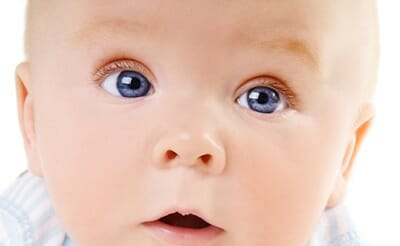Will My Baby’s Eyes Be Blue or Brown?

Are you wondering if your baby’s eyes will stay that deep blue hue they were the day they were born? A lot of anxious parents wonder after first meeting their newborn baby in the hospital, whether or not their baby’s eyes will stay the same color.
While African-American, Hispanic, and Asian babies tend to be born with dark eyes that stay dark, many Caucasian babies are born with deep blue eyes that change once or even several times before their first birthday. So how can you tell what color a newborn baby’s eyes will eventually be?
Why Do My Baby’s Eyes Change Color During the First Year?
So why do some babies have shifting eye colors? The answer lies in melanin, the pigment that produces our skin, hair, and eye colors. Caucasian babies are usually born with their irises (the colored part of the eye) deep blue in color, because they do not contain much melanin. A newborn baby will start to produce melanin at birth, and will continue to produce melanin over the course of the first year.
The additional melanin is what causes many babies’ eyes to change color from “baby blue” or gray to brown, hazel, or green. Even if green or hazel eyes appear lighter than some blue eyes, they actually contain more melanin. Blue eyes have the least melanin, while brown eyes have the most. Around six to nine months is when a newborn’s melanin settles into what is roughly the permanent hue. However, some people’s eyes can continue changing color, even into adulthood.
Genetics and Eye Color
While many babies’ eyes shift color through the first year of life, the final color of their eyes is determined by genetics. A key concept is the difference between genotype and phenotype. Genotype is the actual combination of genes that determines eye color. Phenotype is the actual physical trait of your eye color.
The genotype contains the dominant and recessive genes of the parents, whose combination determines the child’s genes. Brown eyes are the dominant gene for eye color, with lighter eyes typically representing recessive genes.
Will Your Baby Have Eyes Like Yours?
The eyes of the parents can provide a good guideline to a baby’s eye color, but it’s not a 100% certainty. If both parents have brown eyes, there is a 75% chance the child will have brown eyes. If one parent has brown eyes, there is a 50% chance the child will receive brown eyes.
If both parents have blue or green eyes, though, it is almost a 100% certainty that the child will have light eyes, with green eyes being much more rare than blue. This is because if both parents have light eyes, then both have pairs of recessive genes. Since there is no dominant gene to take precedence over the light eyes, the child will have light-colored eyes almost 100% of the time.
[Photo Via: Kolcraft]

